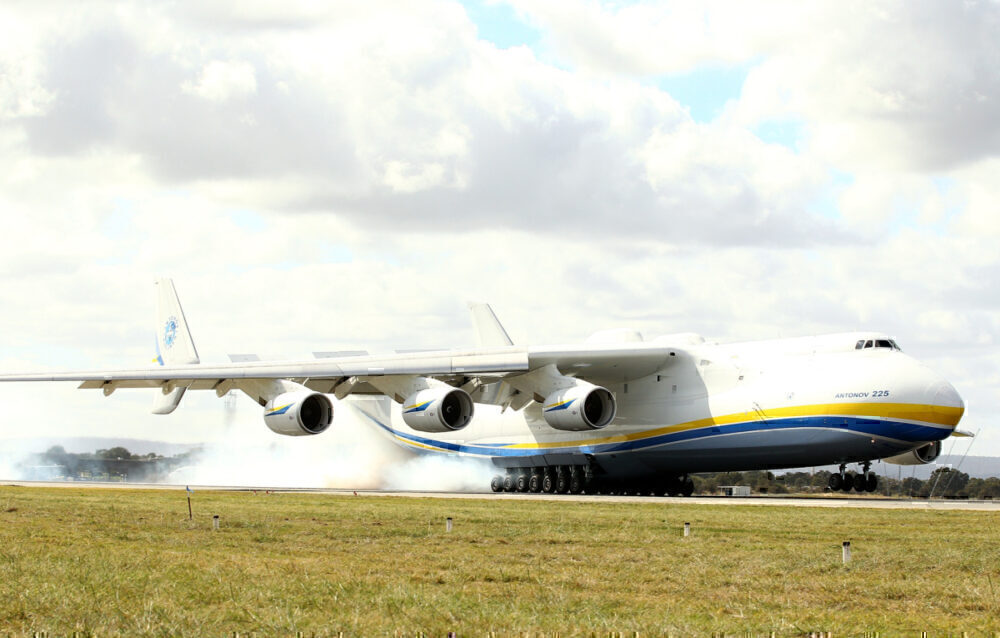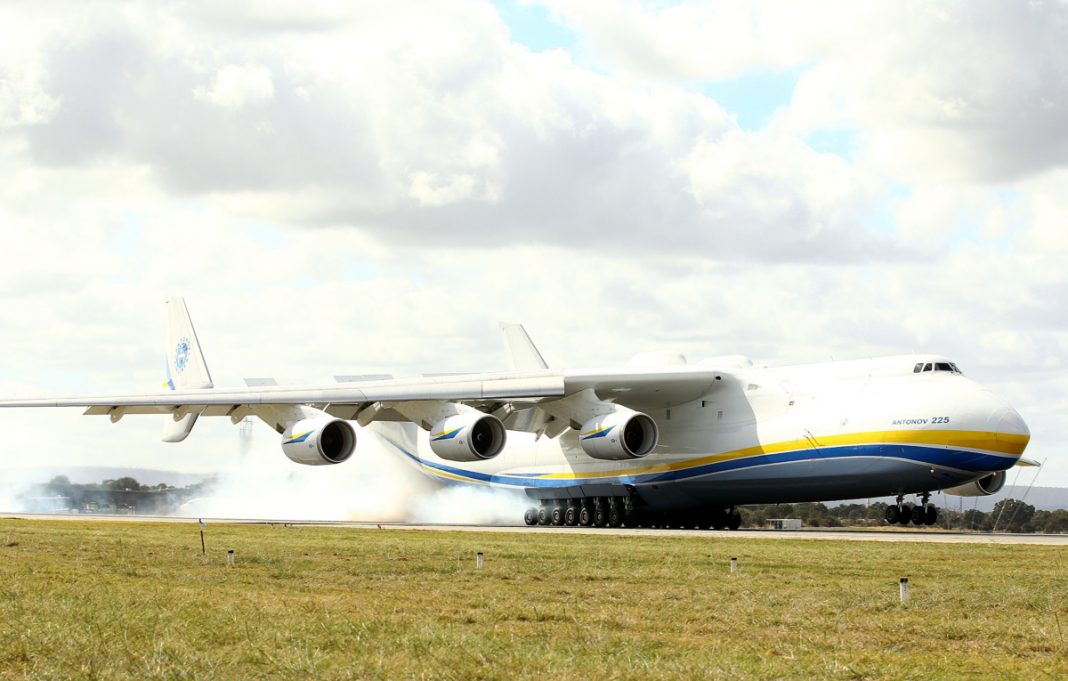The Antonov AN-225 is easily the largest aircraft ever produced. With over 30 wheels, six engines and a significant wingspan, it attracts crowds wherever it goes simply for its size. This week, it arrived at Bangor International Airport and did just that. So, what is it about this giant jet that the world loves so much?

The Antonov AN-225 lands in Bangor
The Antonov AN-225, if known for anything, is recognized by its size. With a wingspan the size of a football field, it is easily the largest aircraft ever created. It dwarfs the double-decker Airbus A380 by comparison and, to this day, still inspires crowds who watch it take-off and land.
It has not been seen for a while; however, earlier this week, the aircraft attracted crowds of people to Bangor, Maine. Despite being employed on several routes throughout the pandemic, the Antonov AN-225 is now in situ for another mission. It’s reportedly being used for charter flights from Bangor International Airport. However, the operator or its purpose is currently unknown.
The aircraft touched down at Bangor International Airport on Friday, July 31st, at 13:00 local time (18:00 GMT), having completed the trip of more than 4,000 miles from Ukraine. Upon its arrival in the US, spectators could be seen filming the landing on smartphones as the aircraft approached the runway. Of course, its size is something that draws a lot of attention, but what exactly is it about the Antonov AN-225 that makes it so exciting?

A history of the Antonov AN-225
The Antonov AN-225 was never intended as a commercial airplane. Its design lay in the transportation of weighty and perhaps unusual cargo. Developed in the 1980s, its purpose was to transport a vehicle for the Soviet Space Program. The reason that the AN-225 is so uncharacteristically large is because it needed to be able to carry the Buran Spaceplane.
With that aim in mind, the aircraft was designed by Viktor Tolmachev, a Russian engineer who anticipated that the AN-225 be a larger variant of the AN-124. Tolmachev led the AN-225 to completion in 1988. The aircraft was registered as UR-82060 and was the only variant ever completed.

It has a wingspan of 290ft with six engines and 32 wheels, some of which are maneuverable. Incredibly, the aircraft has a range of 15,400km when unloaded, reducing to 4,500km when fully loaded. Considering the amount of weight that it can transport, traveling that far across the world is quite a feat.
Interestingly, it can carry its cargo internally, or as part of the upper fuselage, the latter of which was designed explicitly with the Buran Spaceplane in mind. In the past and even more recently, its delivery capabilities have been an asset for international aid.
Notable missions
The Antonov AN-225 has only ever been operated by Antonov Airlines; however, it has been used for multiple charters. Its selling feature is its payload, which is an attractive proposal that comes with a hefty price tag. It costs around $30,000 an hour to run, but, in some situations, it is utterly indispensable.

In 2002, it was used for the first time to transport ready meals from Germany to an American military base. On January 3rd, it carried 216,000 meals to Oman, weighing 187.5 tonnes. That same year, 80,000 Christmas shoeboxes were loaded into its hold and taken to Uganda.
Two years later, in 2004, the AN-225 flew a chimney duct from Billund in Denmark to Kazakhstan.
However, it wasn’t until 2009 that the aircraft made its fame by transporting the heaviest air freight cargo to date. On August 11th 2009, a 189-tonne generator was carried to Armenia for implementation in a gas power plant.

Since then, the AN-225 has been a pivotal part of our recent history. The aircraft was used on COVID-19 missions to deliver immediate medical supplies. Its first was back in April when it flew to Tianjin in China to collect personal protective equipment (PPE) and other medical supplies. It then transported 100 tonnes of cargo from China to Poland, arriving in Warsaw on April 14th.
Since then, it has undergone several other COVID-19 related missions. Quite simply, it can get a lot done in a short amount of time, which is a perfect trait for the current climate.
The future of the Antonov AN-225
Miraculously, the An-225 has always found a purpose and met the needs of many in desperate times. So what does the future look like for the aircraft?

As far as we know, the aircraft will not be taken out of service just yet. While the need to transport medical supplies remain, it’s likely that the AN-225 will not be short of work. On Sunday August 2nd, the aircraft will touch down in Glasgow Prestwick Airport for a refuel before moving onto its final destination.
But that’s not all. Isn’t there another AN-225 in the works? In fact, by this point, two AN-225 aircraft were expected to be in operation. However, due to a lack of demand, the second variant was never completed. Yet, that could be set to change in the coming years. The aircraft remains 70% complete and, with a cash injection, could be in the skies in the coming years. In 2016, a deal was signed to restart the production, which needs an additional $248-353m in funding.
However, in recent weeks, the CEO of Antonov says that the second AN-225 is entirely out of the question.
Do you think the second AN-225 will ever be completed? Do you have an impressive personal story to tell about the aircraft? Let us know your thoughts in the comments.
[ad_2]
Source link



